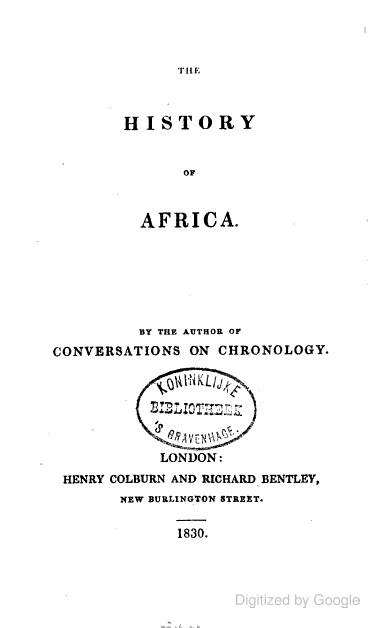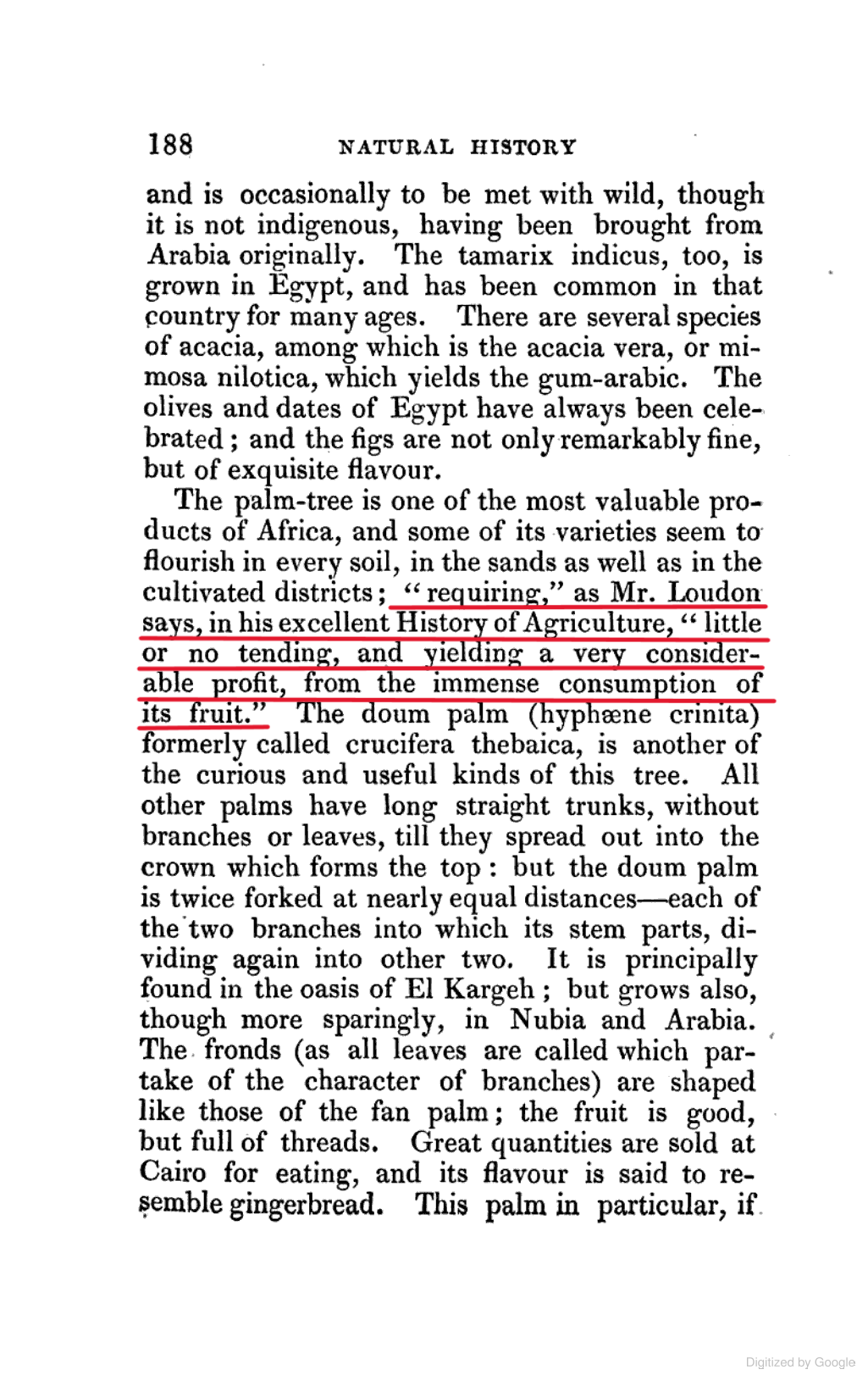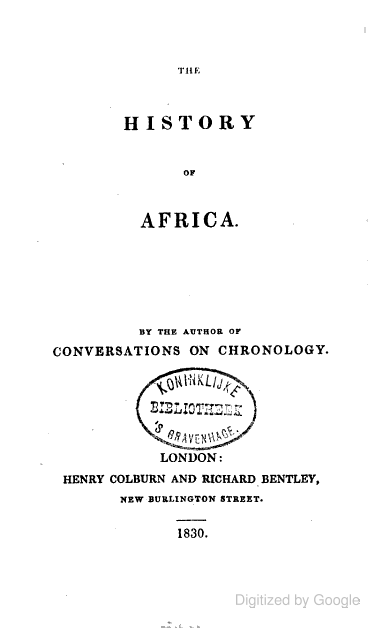This post is part of our Research in Reflection Spotlight Series, which will run through August 2025. After a decade of active and intense research and data creation, the WPHP is coming to a close this summer. To celebrate, this series shares reflections on the WPHP by our Research Assistants, Project Manager, past Project Manager turned Lead Editor, and Project Director, featuring memories, research, lessons learned, and ultimately the impact of the WPHP on the team who produced it.
Authored by: Isabella (Belle) Eist
Edited by: Kate Moffatt
Submitted on: 08/21/2025
Citation: Eist, Isabella. "Reflections of a Research Assistant: Jane Loudon and Cases of Tricky Attribution." Women’s Print History Project, 21 August 2025, https://womensprinthistoryproject.com/blog/post/150.

Figure 1. Jane Loudon. The History of Africa. 1830, Google Books
Joining the WPHP as an undergraduate RA in 2021 first prompted my fascination with the women who composed, produced, and circulated books—often anonymously and without recognition—throughout the long eighteenth century. As the WPHP underscores the breadth of women’s involvement in the book trades and, thanks to the advanced title search feature, is highly searchable, it is particularly useful for students and scholars hoping to discover texts that fit specific research parameters. Indeed, the WPHP’s extensive dataset both facilitated my search for a unique text to center my MA project around and helped me navigate the subsequent research. When I began the initial planning for my project last Fall, I was on the hunt for a lesser known text that checked a few specific boxes: this would be a book that was written by a woman author, published between 1800–1837, and featured elements we would now describe as supernatural or speculative. At the time, I had recently read and thoroughly enjoyed Joanna Baillie’s “Witchcraft: A Tragedy in Prose” (one of several plays that invoke gothic and supernatural subjects in her 1836 collection, Dramas, by Joanna Baillie. In Three Volumes) and was hungry for another text engaging with magical, eerie, or uncanny themes. Using the WPHP’s advanced title search, I was able to filter by gender, date of publication, and input such keywords as “witch,” “ghost,” “phantom,” and “mummy.” The latter term brought forward Jane (Webb) Loudon’s unusual first novel, The Mummy! A Tale of the Twenty-Second Century (1827). I had never heard of the novel or its young authoress, but from the first sentence of the first chapter—“In the year 2126, England enjoyed peace and tranquility under the absolute dominion of a female sovereign”—I was hooked on this proto-science fiction text that Loudon herself termed “strange” and “wild” (The Mummy! vol.1: 1; Self-Instruction for Young Gardeners xxxv). In detailing the reanimation of a mummy and his subsequent escapades in England, Loudon penned the earliest example of a literary work in the ‘mummy’ genre, a category which appropriates ancient Egyptian mummies as a popular subject for Western media. Though she laid the initial groundwork for popular media like Karl Freund’s 1932 film The Mummy with Boris Karloff, Stephen Sommers’s 1999 film of the same name, or even the latest reboot of the franchise featuring Tom Cruise and an attractive, female mummy, most do not recall Loudon’s creation of the archetype or that the first mummy was not intended to be monstrous or evil. As it happens, Loudon’s mummy character is more akin to an underqualified life coach dispensing romantic and political advice and little resembles the frightening and vindictive mummies common in later media.
My research into Loudon’s life for my MA project often worked in tandem with my work on the WPHP, enabling me to add further detail to her persons record and confidently ascribe two additional titles to her. The WPHP routinely contends with titles that were published anonymously and contain minimal or no evidence of their authorship. I ran into one such case of tricky attribution when I attempted to verify a title attached to Jane Loudon in the WPHP, The History of Africa. By the Author of Conversations on Chronology (1830), that was elsewhere attributed to Jane Marcet. At first glance, I was skeptical that Loudon had written The History of Africa (or, in turn, Conversations on Chronology, a title that was not yet in the database). In contrast to her earlier works—one volume of poetry and two works of fiction—both The History and Conversations on Chronology seemed rather outside of Loudon’s wheelhouse. Published anonymously, Conversations Upon Comparative Chronology and General History, from the Creation of the World to the Birth of Christ (1830), draws patent inspiration from Jane Marcet’s Conversations series (which included such fascinating topics as Political Economy, Natural Philosophy, and Vegetable Physiology), leading some sources to misattribute both The History of Africa and Conversations Upon Comparative Chronology to Marcet. Three pieces of key evidence emerged when I began to search for proof that Jane Loudon authored these two texts. First, the Orlando: Women’s Writing in the British Isles from the Beginnings to the Present database notes in their entry for Jane Marcet that although The History of Africa is “ascribed to JM [Jane Marcet] in the Bodleian Library catalogue (and others),” its author “must…be Jane Webb” (“Jane Marcet”). After locating a digitization of The History in Google Books (which erroneously lists Marcet as its author), I found two further clues that point toward Loudon’s authorship. The History of Africa, published in the same year that Jane Loudon and John Claudius Loudon married, mentions and quotes from John Loudon’s An Encyclopedia of Agriculture, which Jane Loudon lauds as an “excellent” source (188). In addition to this reference to her new husband’s work, another link that ties together The History of Africa and The Mummy! as texts clearly written by the same person is Loudon’s choice of historical sources. In both cases, Loudon relies heavily on Greek historian Herodotus as her primary source on life in ancient Egypt and the surrounding region. Other than the brief attribution to Loudon in Orlando, I could find only one other source that discussed the identity of the anonymous author of The History of Africa. Tucked away in the endnotes of the only twenty-first-century scholarly edition of Loudon’s The Mummy!, editors Nickianne Moody and Andy Sawyer state that “[William] Jerdan hired [Jane Loudon] to provide The History of Africa (1830), the third volume in his ‘Juvenile Library’ series for Colburn and Bentley” (xviii). The History of Africa ultimately became the final installment in the “badly-reviewed series” (xviii).

Figure 2. Jane Loudon quotes her husband’s publication in The History of Africa, Google Books
Finding and digging through rabbit holes like the one I had the chance to explore around Jane Loudon is a shared experience among the WPHP team (we even did a spotlight series on them). Certainly, my favourite part of any WPHP meeting is when someone brings forward something unusual or unexpected they noticed in the data and now feel that unavoidable itch to research further. Tracing women’s involvement in the book trades requires us to work with frequently imperfect or missing data, so we take what evidence we can find—even if it’s as small as the examples detailed above.
WPHP Records Referenced
Dramas, by Joanna Baillie. In Three Volumes (title)
Loudon , Jane C. (person, author)
The Mummy! A Tale of the Twenty-Second Century (title)
The history of Africa. By the author of Conversations on chronology. (title)
Jane Marcet (person, author)
Down the Rabbit Hole: Researching Women in the Book Trades Spotlight Series (spotlight series)
Works Cited
Brown, Susan, Patricia Clements, and Isobel Grundy, editors. “Jane Marcet.” Orlando: Women's Writing in the British Isles from the Beginnings to the Present, Cambridge University Press, 2024, https://orlando-cambridge-org.proxy.lib.sfu.ca/profiles/marcja.
Loudon, Jane. The Mummy!: A Tale of the Twenty-Second Century; in Three Volumes. Henry Colburn, 1827, https://catalog.hathitrust.org/Record/100859652.
Loudon, Jane. The Mummy!: Or A Tale Of The Twenty-Second Century. Edited by Nickianne Moody and Andy Sawyer, Edward Everett Root Publishers, 2021.
Loudon, John Claudius. Self-Instruction for Young Gardeners, Foresters, Bailiffs, Land-Stewards, and Farmers. Edited by Jane Loudon, Longman, Brown, Green, and Longmans, 1845, http://archive.org/details/b29349886.
